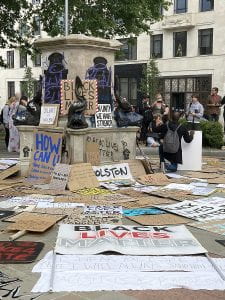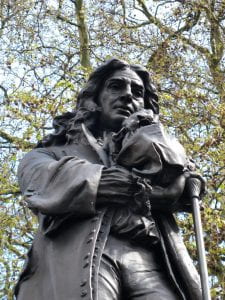By Prof Antonia Layard, Professor of Law (University of Bristol Law School)
 The toppling of the statue of Edward Colston has made the front pages of newspapers all over the world. “Hooray!” read an email from an Australian friend the next morning, “I’ve just been enjoying reading and viewing the pushing of that vanity statue of a slave trader into Bristol waters and thought of you and my brief stay in Bristol. What a great moment in the history of your city. Took far too long but at last the day arrived”.
The toppling of the statue of Edward Colston has made the front pages of newspapers all over the world. “Hooray!” read an email from an Australian friend the next morning, “I’ve just been enjoying reading and viewing the pushing of that vanity statue of a slave trader into Bristol waters and thought of you and my brief stay in Bristol. What a great moment in the history of your city. Took far too long but at last the day arrived”.
As many more now know, Edward Colston (1636-1721) was the son of a prosperous Bristol merchant who after an apprenticeship with the London Mercers’ Company in 1654, established a successful business in London, trading with Spain, Portugal, Italy, and Africa. In 1680 he became a shareholder in the Royal African Company, which had a monopoly on trade with Africa until 1688, after which it received fees from English traders. Colston took a leading role in the Company, serving on several committees, becoming deputy governor in 1689. The RAC is estimated to have transported around 84,000 African men, women and children, who had been traded as slaves in West Africa, to the Caribbean and the rest of the Americas, of whom 19,000 died on their journey. Thousands who arrived had the initials “RAC” branded on their chests. In 1863, Colston was both elected a free burgess of the city and became a member of the Society of Merchant Venturers, enabling him to trade out of Bristol before towards the end of his life becoming an MP for Bristol (1710-14), despite living in Mortlake in Surrey. (more…)



